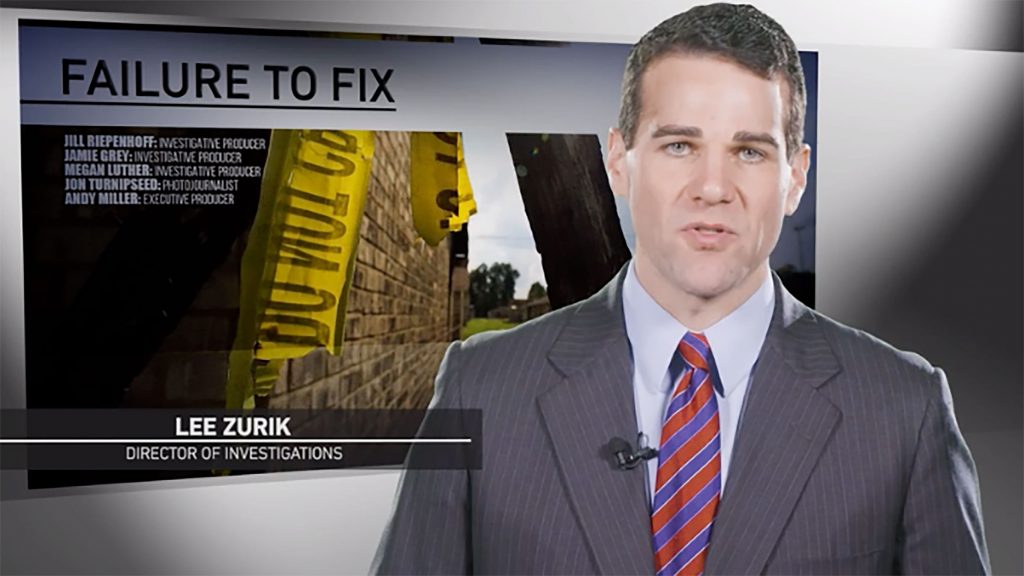It doesn’t take an Einstein to know that in this age of streaming and on-demand viewing, linear TV notions of time and space don’t apply. But it did take a Breland — Sandy Breland, Group Vice President at Raycom Media — to apply that new reality to investigative reporting. Breland’s back-of-a-napkin-simple idea: create an OTT channel built around Raycom’s national investigative team; bring in other partners to achieve a critical mass of content; and share it all with a broader audience. “We have this work that we think is really important,” she says. “We believe that if we can get it in front of more people, there’s an appetite for it.”
Breland’s brainstorm was in April. Two months later, Raycom Media CEO Pat LaPlatney announced the launch of InvestigateTV at the Investigative Reporters and Editors (IRE) conference in Orlando, starting on the Roku streaming channel, now on Amazon Fire too, with Apple TV coming soon.

The mainstay of InvestigateTV is the scarily prolific Lee Zurik, Chief Investigative Reporter at newly-anointed news leader WVUE in New Orleans and head of Raycom’s 15-month-old national unit. A local satirical site, Neutral Ground News, “reported” on a “five-year study” claiming that “Sphincters tighten 93% wherever Fox 8 Investigative Reporter Lee Zurik goes.” (In his spare time, Zurik also co-anchors at 5, 9 and 10 p.m.) It was Zurik’s ambitious multi-part series Licensed to Pill, which exposed doctors prescribing addictive opioids for profit, that inspired the new channel.

Zurik presides over a Switzerland of partners who have “a shared commitment to investigative journalism,” in Breland’s words, and contribute content gratis. They include the prestigious NY-based nonprofit ProPublica, which got nearly $200,000 from the Knight Foundation (which also underwrites this Lab) to upgrade its video reporting; the award-winning News21, a Carnegie-Knight student reporting project based here at the Walter Cronkite School of Journalism; NerdWallet, which offers money-saving advice; and a San Diego-based nonprofit called inewsource that specializes in data-driven investigations. The Raycom stations contribute individual stories and franchises, and they can use all of the content from any of the partners.
The result: more stories than you can shake a Roku stick at — at least 200 videos by Zurik’s estimate and counting, with two or three new ones added every week. It’s an eclectic and wide-ranging collection that includes topical exposés of fraud, waste and corruption by Zurik and others; evergreen consumer stories on money, health, and other news you can use from NerdWallet and the stations; and in-depth reporting, like the ambitious multi-state Hate in America series from News21, or the documentary Killing Pavel, which follows the dogged efforts of a group of Ukrainian reporters as they find critical clues the police missed (or ignored) in the car-bomb assassination of a colleague in Kiev. Given the long-form nature of much investigative journalism, “OTT makes perfect sense,” says Zurik. “The content dictates the length.” When’s the last time you heard that in your newsroom?

Zurik says viewers seem to prefer the longer stories, and in fact average viewing time on the channel is now up to an impressive 25 minutes plus. There have been about 10,000 downloads of the OTT app, and the channel is attracting new viewers to Raycom. Not surprisingly, Zurik’s home base of New Orleans is one of the top five markets for InvestigateTV, but the others are Atlanta, LA, NY and Dallas — cities with no Raycom station.
InvestigateTV is an unabashed celebration of enterprise reporting in all its forms. You can watch a stream of the RTDNA Edward R. Murrow awards — Zurik’s team won two national awards — or an original interview show called Post in which investigative reporters talk about how they got their big story. “In this climate, anything that we can do to show the process of how stories come about and how we report stories is important,” says Zurik. “This is our way to help with media transparency.”
Of course passion alone doesn’t pay the bills, although no one seems too concerned about that for now. “The truly innovative thing we did is going into this without knowing the financial model, how we’re going to monetize it,” says Zurik. “We had to find a way to do this and find the resources and build the product first,” adds Breland. “We’re now looking at the best way to build the financial model. But we believe the support will be there for this kind of quality journalism.”
In the meantime, note to fraudsters, tax cheats, scam artists, swindlers and other lowlifes — you may want to flee to higher ground.
If you are experimenting with new platforms and extending your broadcast content in interesting ways, please let us know at cronkitenewslab@asu.edu.